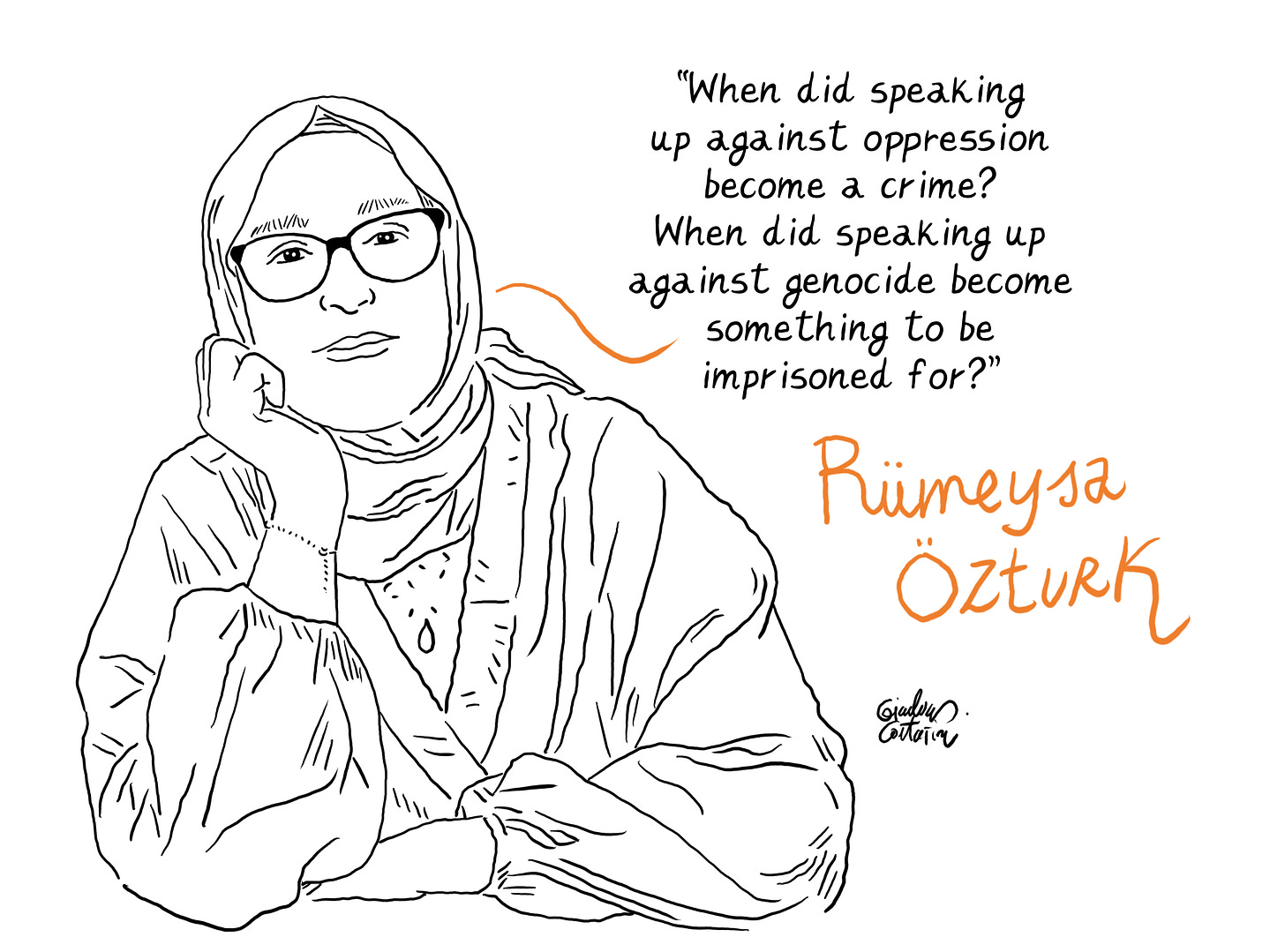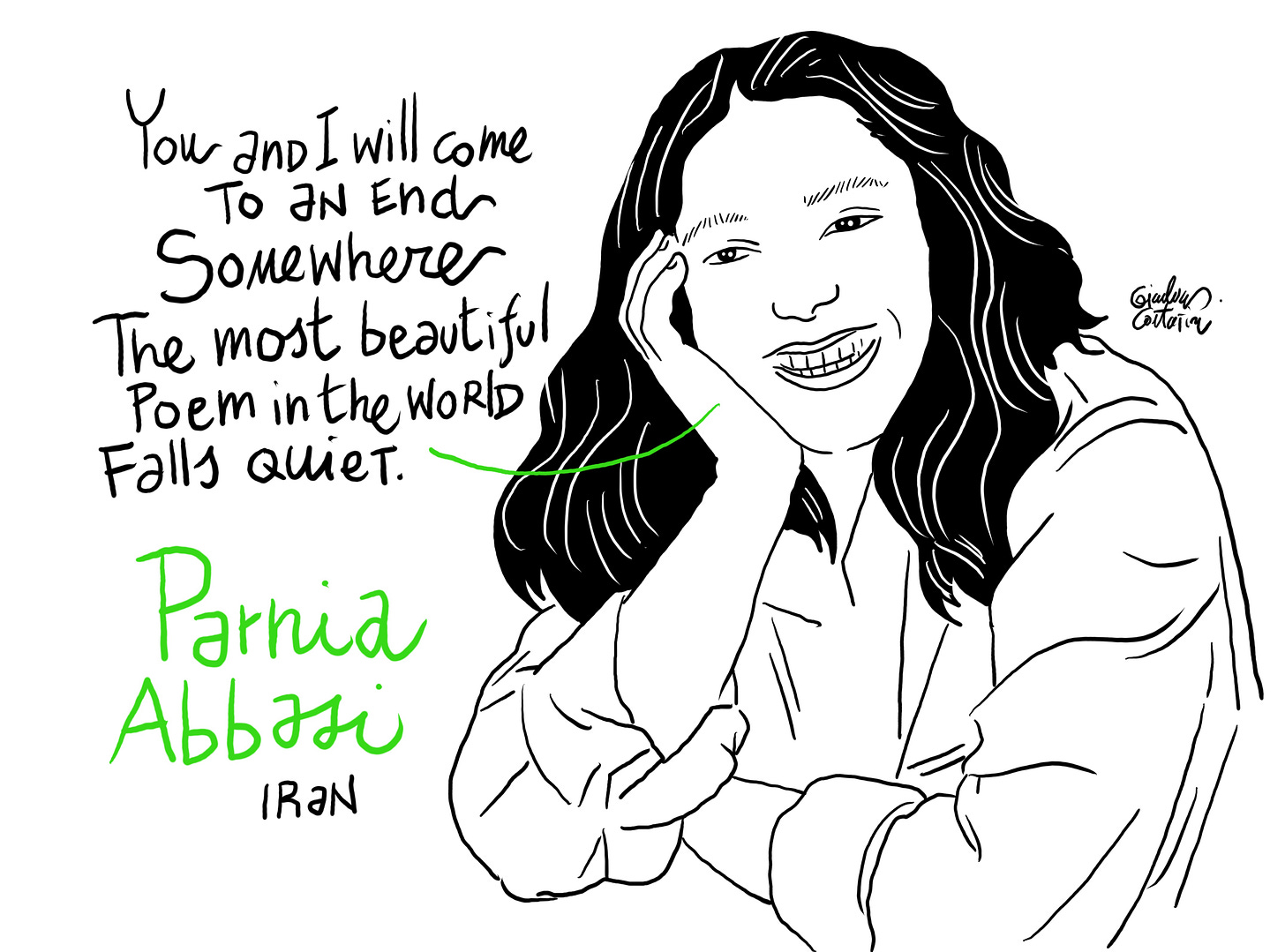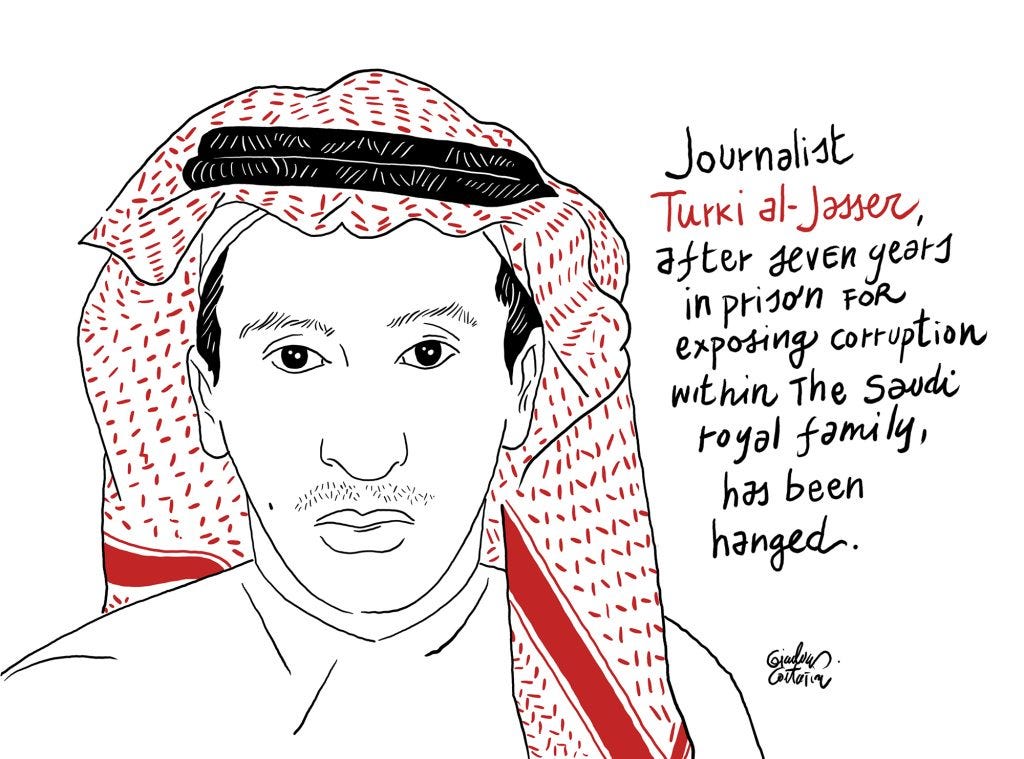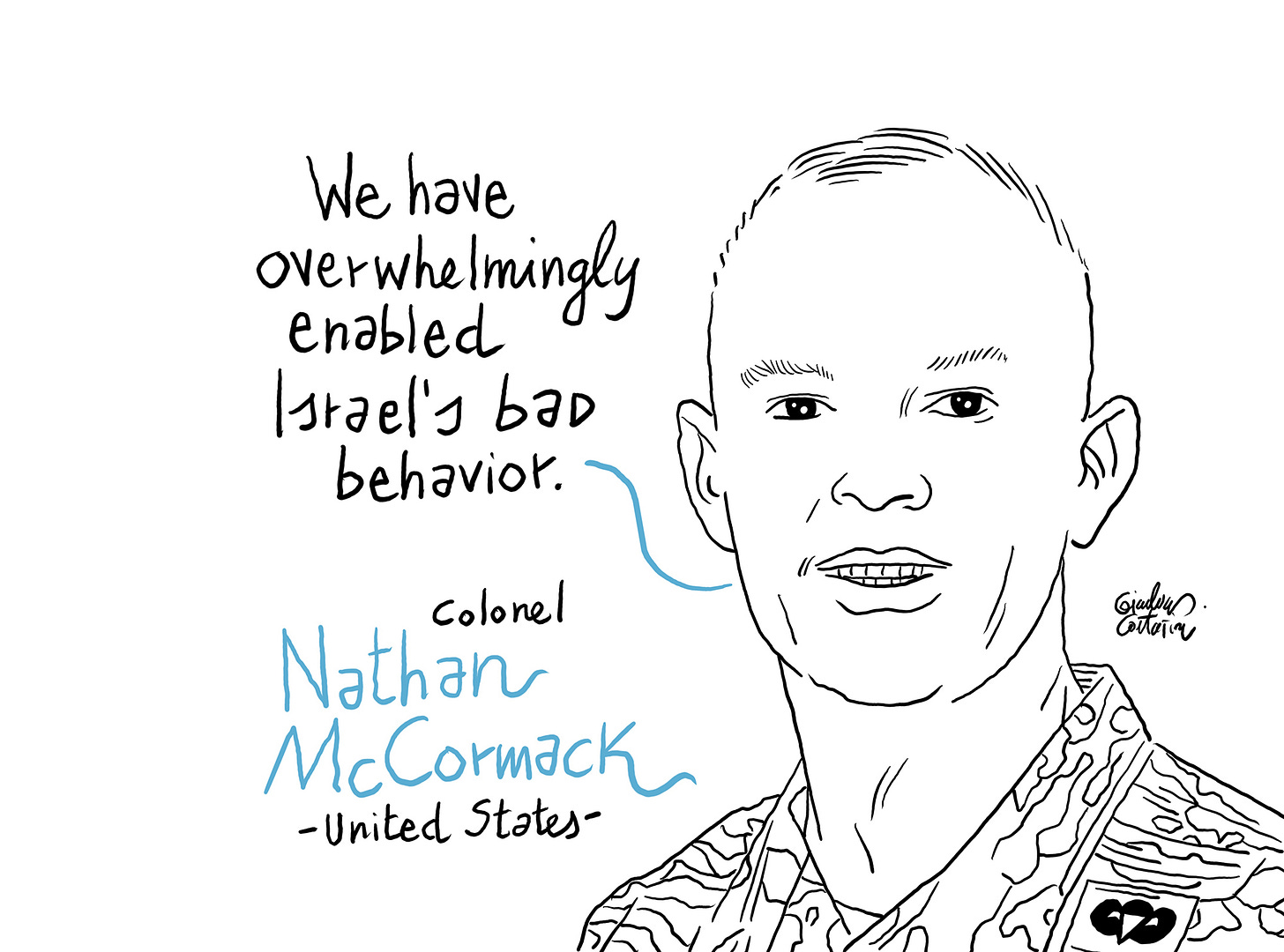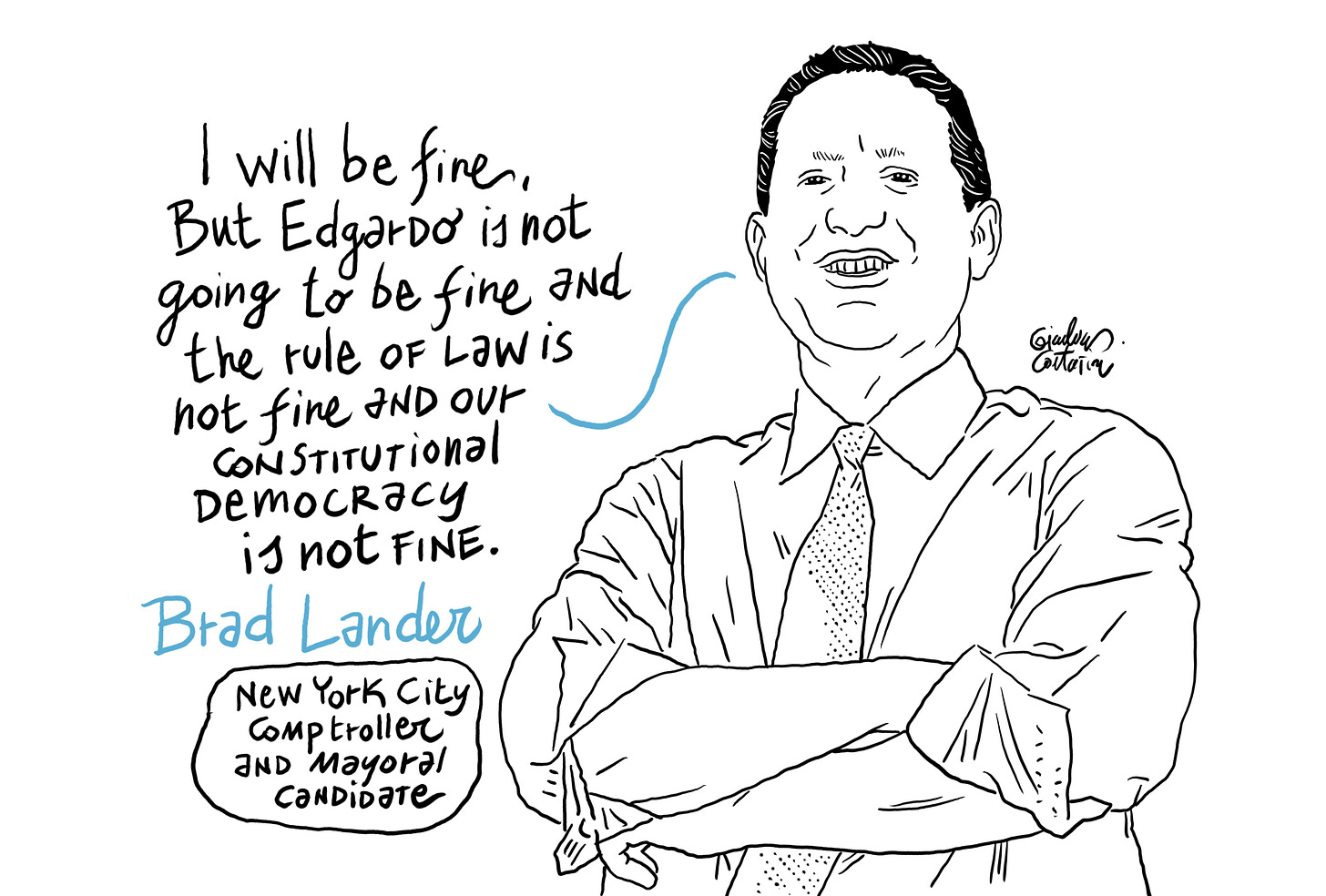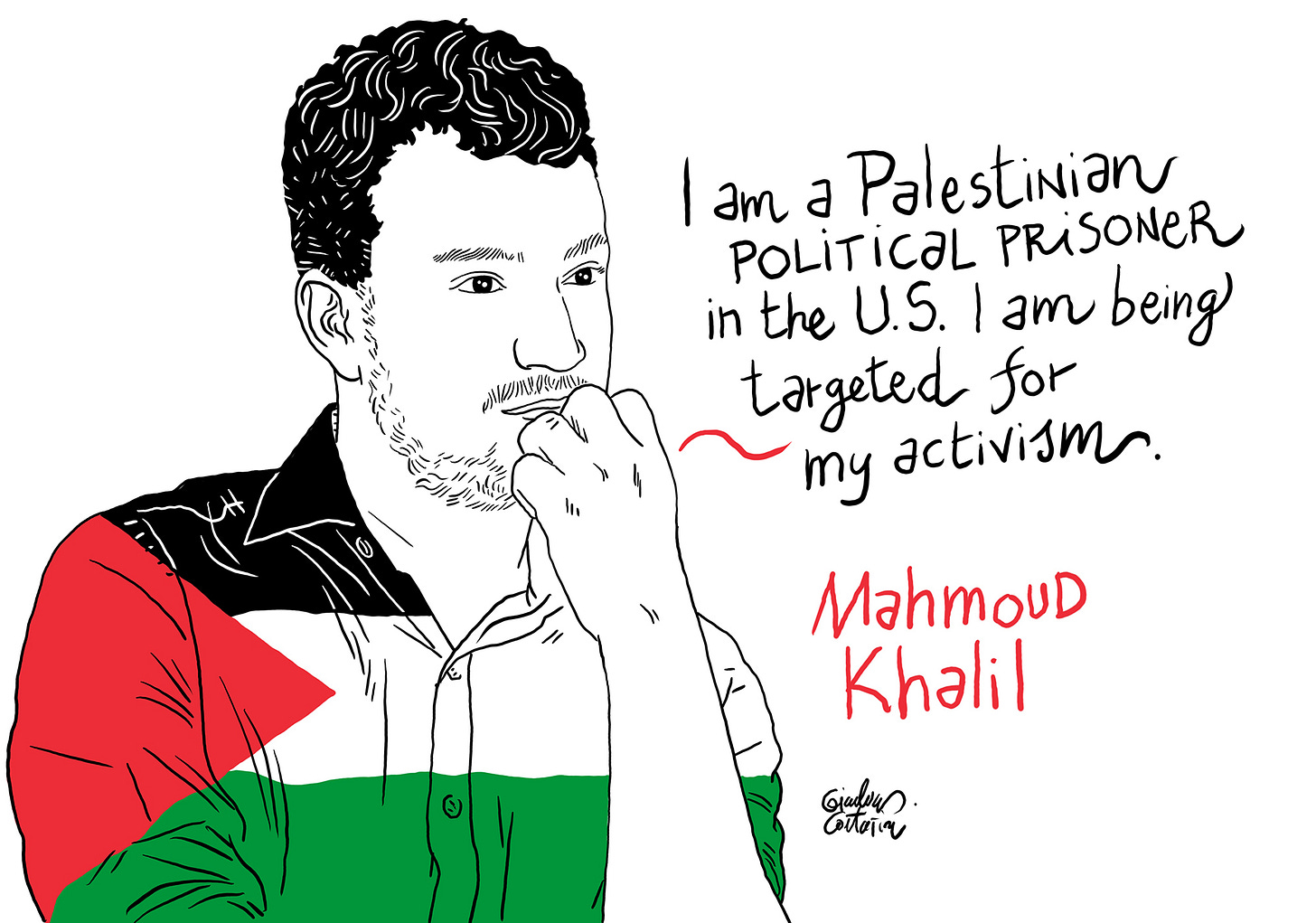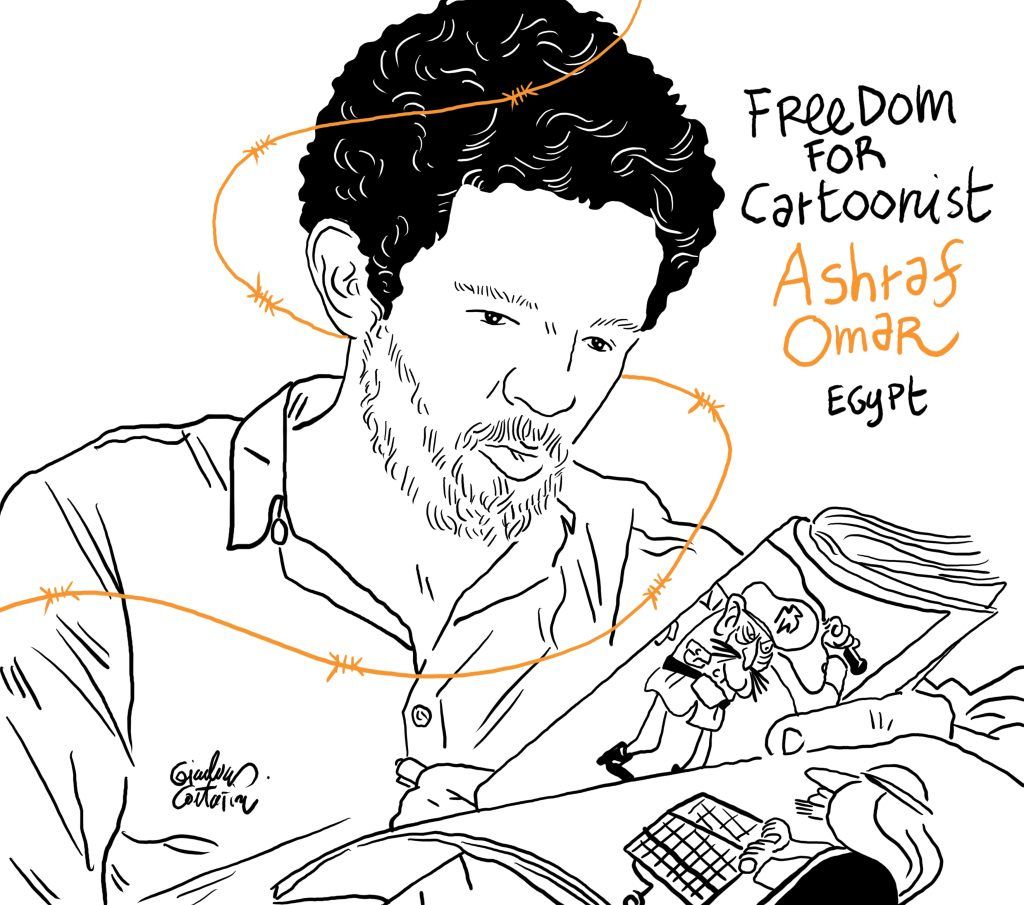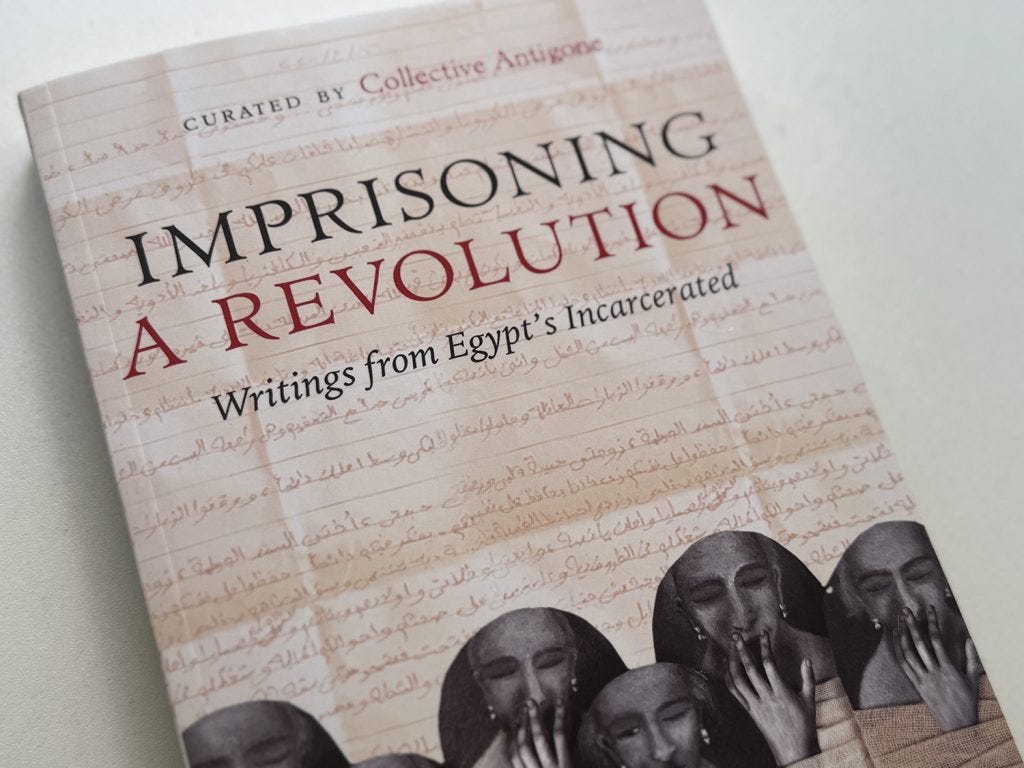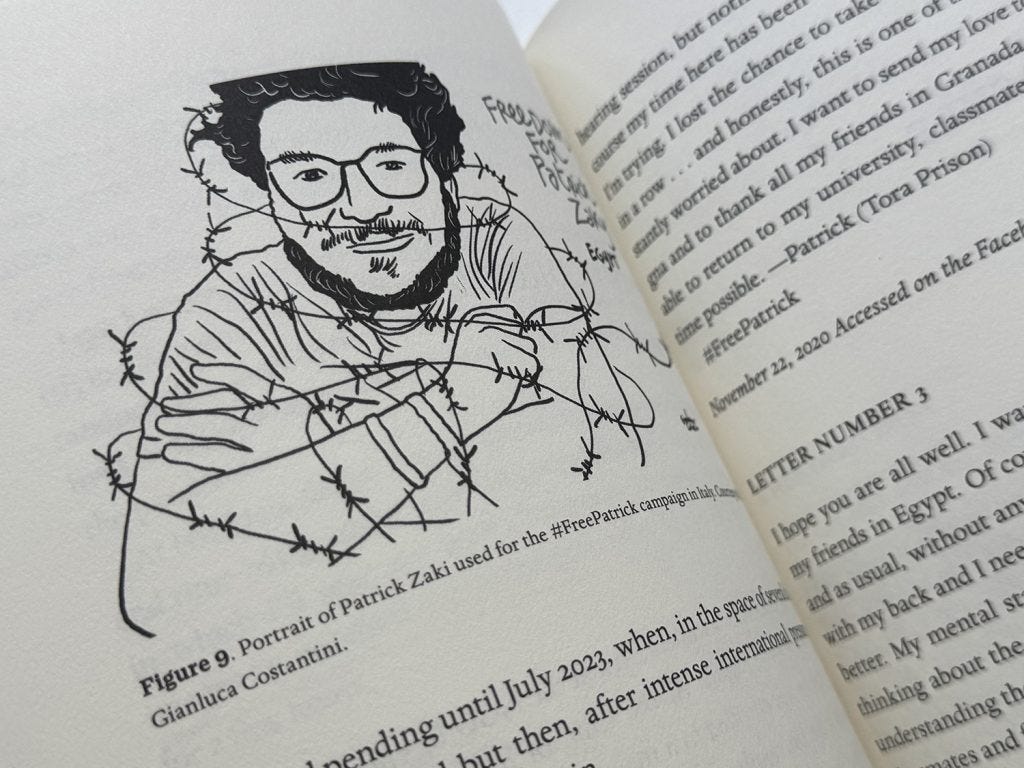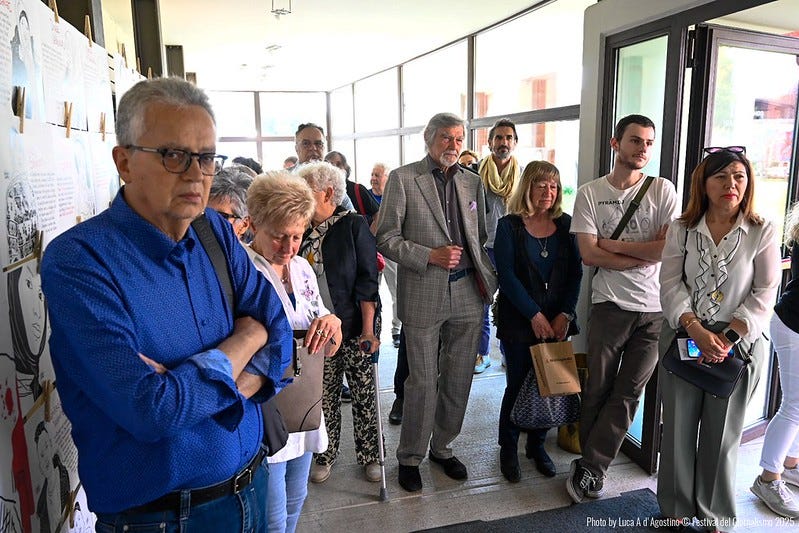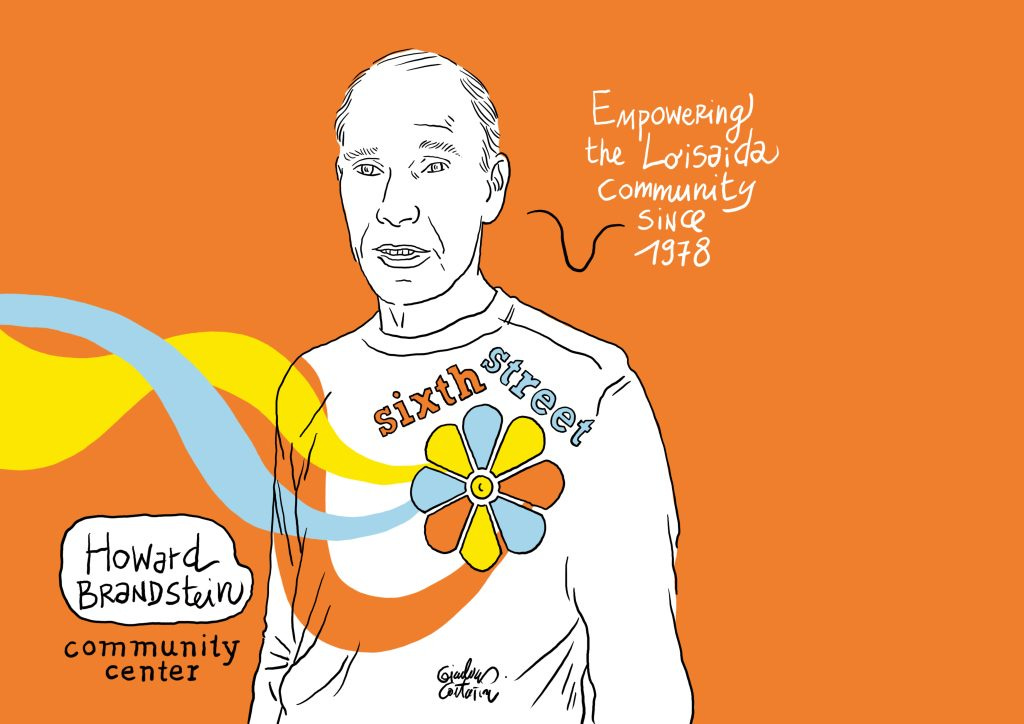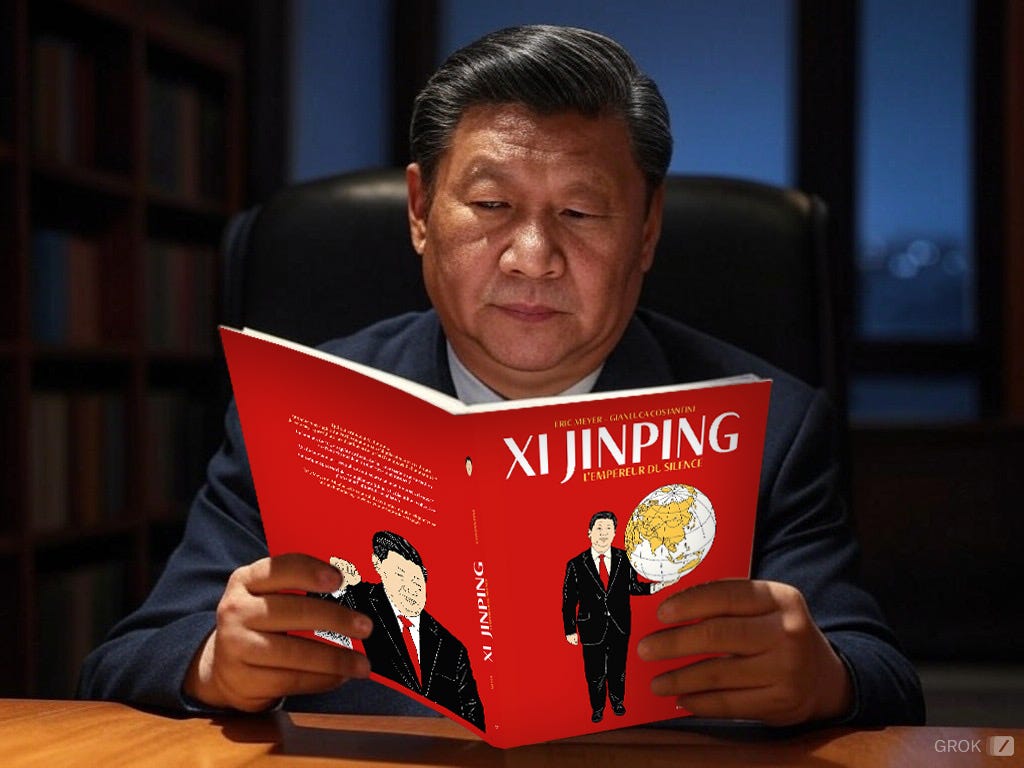Visual chronicles from the margins of the world
A journey through struggles, hope and dissent, one drawing at a time
When Dissent Becomes a Crime: The Story of Rümeysa Öztürk
“When did speaking up against oppression become a crime? When did speaking up against genocide become something to be imprisoned for?” Rümeysa Öztürk
Rümeysa Öztürk is a young Turkish researcher, a doctoral candidate at Tufts University in the United States, and a Fulbright scholar. She focuses on child development studies, but her name has gained international attention due to an incident that sparked a wide debate on civil rights, freedom of expression, and U.S. immigration policies.
In March 2024, together with other students, Öztürk signed and helped publish an editorial in the university newspaper, The Tufts Daily, calling on the university to recognize the violence against Palestinians as genocide and to cut all investments in companies linked to Israel. This peaceful stance, rooted in freedom of opinion, had unexpected consequences: on March 25, 2025, ICE agents (the U.S. Immigration and Customs Enforcement agency) arrested her near her home in Somerville, Massachusetts, and immediately revoked her student visa.
Transferred to a detention center in Louisiana, far from where she was arrested, Öztürk remained in custody for weeks, while her lawyers and several civil rights organizations — including the ACLU — denounced the illegitimacy of the measure and what they saw as an attempt to criminalize a simple act of political dissent. A federal judge in Vermont, considering the forced transfer to another state unjustified, ruled that the case should be heard in Vermont and blocked her immediate deportation.
After a long legal battle, the court found that Rümeysa Öztürk posed neither a danger nor a flight risk and granted her release on bail. On May 10, 2025, she returned to Boston, welcomed by colleagues and activists, stating that she still has faith in the American justice system and intends to continue her studies.
Her story is now seen as a symbolic case of the risks faced by foreign students and international researchers in the United States when they voice critical opinions on foreign policy issues. It continues to be cited in debates on academic freedom, freedom of speech, and the use of immigration enforcement as a tool of political pressure.
Read more: Channeldraw
Parnia Abbasi: A Young Poet Silenced by War in Tehran
You and I will come to an end
Somewhere
The most beautiful poem in the world Falls quiet.
Abbasi’s poem The Extinguished Star
Parnia Abbasi was a young Iranian poet, English teacher, and bank employee who was killed during the night between June 13 and 14, 2025, in an Israeli airstrike that hit a residential complex in the western part of Tehran. She was about 24 years old and dreamed of pursuing a master’s degree in management after completing her bachelor’s in translation at Qazvin University.
Passionate about poetry since adolescence, she published her verses in literary magazines and often shared intimate, reflective texts. In one of her last poems, she wrote words that now sound hauntingly prophetic: “I burn, I fade, I become smoke…”
On the night of the attack, a missile struck the building where she lived with her family. Alongside Parnia, her younger brother and their parents were also killed. According to local and international sources, the target of the airstrike was a suspected nuclear scientist residing in the same complex, but the explosion caused a massive collapse, killing dozens of civilians, including many children.
Read more: Channeldraw
Turki al-Jasser: The Hanging of a Journalist and Saudi Arabia’s Machinery of Digital Repression
On June 14, 2025, Saudi Arabia’s Ministry of Interior announced the execution by hanging of Turki bin Abdulaziz al-Jasser, a prominent journalist and blogger who had been imprisoned for seven years on charges of treason, foreign collaboration, financing terrorism, and endangering national security and unity.
But the story of al-Jasser goes deeper, revealing the sophisticated digital surveillance and intimidation system run by key figures in the Saudi regime. Al-Jasser was believed to be the person behind the Twitter account Kashkool (@calouche_ar), which reported on abuses and corruption within the Saudi royal family. The account went silent in 2016 — the same year Crown Prince Mohammed bin Salman became Saudi Arabia’s de facto ruler.
According to multiple sources, including renowned human rights activist Yahya Assiri, al-Jasser’s identity was uncovered after Saudi “cyber-warriors” infiltrated Twitter’s Dubai headquarters. This operation was part of a broader effort led by Saud al-Qahtani — a top adviser to the crown prince and the architect of Saudi Arabia’s notorious online army, which harassed and threatened critics of the regime worldwide.
Qahtani, nicknamed the “Saudi Steve Bannon,” masterminded social media campaigns that targeted journalists and dissidents, including Washington Post columnist Jamal Khashoggi, who was murdered inside the Saudi consulate in Istanbul in 2018. Qahtani had even warned on Twitter: “Does your alias protect you from the #blacklist? States have ways of finding out the account holder’s name. There are technical ways to trace IP addresses. A secret I won’t tell…”
In March 2018, Turki al-Jasser was forcibly disappeared by Saudi authorities. He was denied access to a lawyer or his family and was allegedly subjected to torture and inhumane treatment. Some reports claimed he died in detention from torture, but these reports remained unconfirmed until the Ministry of Interior announced his execution in 2025.
The execution has drawn outrage from international press freedom advocates.
“We are outraged by Saudi Arabia’s execution of prominent journalist Turki al-Jasser, who was detained for seven years because the regime believed he exposed corruption within the royal family,” said Carlos Martínez de la Serna, Chief Program Officer at the Committee to Protect Journalists (CPJ). “The international community’s failure to secure justice for Jamal Khashoggi emboldened Crown Prince Mohammed bin Salman to continue persecuting journalists. Today, another Saudi journalist has paid the price.”
Al-Jasser was well known for covering sensitive issues such as women’s rights, the Arab Spring, and high-level corruption. He contributed to the now-defunct Saudi newspaper Al-Taqrir and ran a personal blog between 2013 and 2015.
In 2024 alone, Saudi Arabia carried out 330 executions — nearly double the previous year’s figure and the highest in decades. More than 100 executions have already taken place in the first half of 2025.
UN experts and human rights groups have repeatedly urged the Saudi government to halt executions and ensure fair trials, warning that due process is routinely violated.
Read more: Channeldraw
Colonel Nathan McCormack’s Suspension Highlights Limits of Criticism Against Israel
“We have overwhelmingly enabled Israel’s bad behavior.” Colonel Nathan McCormack
Colonel Nathan McCormack is a U.S. military officer who, until June 2025, held a prominent position as the head of the Levant and Egypt branch within the J5 directorate of the Joint Chiefs of Staff, the strategic planning body of the U.S. armed forces. His career suffered a sudden setback when the Jewish News Syndicate, a hawkish and Israel-linked outlet, revealed a series of posts from McCormack’s private social media account in which he repeatedly criticized Israel and U.S. policy in the Middle East.
According to Middle East Eye, McCormack’s posts accused Washington of enabling Israel’s “bad behavior” and claimed: “The Western states go to great lengths to avoid criticism of Israel, much out of Holocaust guilt.” He also wrote that “Israel’s actions over decades have prompted accusations of ethnic cleansing and genocide,” and referred to Israeli Prime Minister Benjamin Netanyahu and his allies as “Judeo-supremacist cronies,” accusing them of wanting “to expel [Palestinians] and cleanse ‘Eretz Israel’ [Israeli territory] of ethnic Palestinians.” In another post, he described Israel as “our worst ‘ally.’ We get literally nothing out of the ‘partnership’ other than the enmity of millions of people in the Middle East, Africa and Asia.”
Following the exposure of these posts, McCormack was immediately removed from his position and returned to his service branch, meaning he is no longer assigned to the Joint Staff while the matter is under investigation. A Pentagon official confirmed that the Department of Defense is “aware of the situation” and has assigned an investigating officer to review the archived posts, stating that “the content posted on the X account does not reflect the position of the Joint Staff or the Department of Defense.”
The incident has sparked significant debate on social media and among commentators, who point out that while the U.S. Constitution’s First Amendment guarantees free expression, criticism of Israel often appears to be treated as an exception. Many noted that it is common to criticize even the U.S. president without facing professional repercussions, whereas similar remarks about Israel can lead to severe consequences — a pattern some argue highlights the influence of pro-Israel lobbying networks in Washington.
Read more: Channeldraw
New York’s Brad Lander Faces ICE Detention Amid Immigration Crackdown
Brad Lander, the current New York City Comptroller and mayoral candidate, was arrested on Tuesday, June 17, 2025, outside the federal immigration courthouse in Manhattan. Lander was accompanying Edgardo, a Spanish-speaking immigrant New Yorker, to protect him from an illegitimate arrest by ICE (Immigration and Customs Enforcement) agents, who have become increasingly aggressive in detaining people without warrants.
When a team of masked agents tried to take Edgardo away, Lander physically intervened, repeatedly asking, “Do you have a judicial warrant? I will let go if you have a judicial warrant.” The agents did not show any warrant and forcibly handcuffed him. During the arrest, Lander protested: “You don’t have the authority to arrest U.S. citizens asking for a judicial warrant.”
Both Edgardo and Lander were detained. While Lander was released after a few hours without formal charges, Edgardo remained in custody at an ICE detention center, with no guarantees of legal defense. As he left the courthouse, accompanied by New York Governor Kathy Hochul—who called the arrest “This is bullshit” on camera—Lander declared: “I will be fine, but Edgardo is not going to be fine and the rule of law is not fine and our constitutional democracy is not fine.”
The video of his arrest went viral, sparking a wave of criticism. Outside the courthouse, a crowd of New Yorkers and numerous politicians awaited him in solidarity, while current Mayor Eric Adams offered only formal statements. Andrew Cuomo, former governor and frontrunner in the mayoral race, was absent but condemned the arrest. Zohran Mamdani, Cuomo’s progressive rival and Lander’s ally, rushed to the scene.
The arrest raised Lander’s profile, a longtime civil rights activist who had been trailing Cuomo and Mamdani in the polls. Lander harshly criticized both Adams, accusing him of having “sold out the city” through corruption, and Cuomo, calling him “an abusive bully who doesn’t love New York, only himself.” Despite some criticism for endorsing Mamdani—of Indian origin and known for pro-Palestinian views—Lander defended the choice as a symbol of politics that unites diverse communities: “A Jewish New Yorker and a Muslim New Yorker endorsing each other is a hopeful sign for the city.”
Lander is the third Democratic politician recently detained by Department of Homeland Security agents as part of Trump’s crackdown on immigrants: before him, California Senator Alex Padilla and Newark Mayor Ras Baraka were arrested. For Lander, this clearly shows the Trump administration’s promise to “liberate” cities like New York and Los Angeles through fear and repression to silence opponents and enforce an aggressive immigration policy.
The day after the arrest, Lander said he had no news about Edgardo. He recounted speaking with the two ICE agents who detained him: both were immigrants—one a Pakistani resident of Brooklyn, the other an Indo-Guyanese from Queens—and they told him they were working exhausting shifts. Along with rabbis, lawyers, and activists from groups like Jews for Racial and Economic Justice and Immigrant Act, Lander has long volunteered to accompany immigrants to court to protect them from abuse and arbitrary arrests.
“I will sleep in my bed tonight, but Edgardo will sleep God knows where, without a lawyer, without defense, in a country that claims to be founded on equal justice for all,” Lander said.
As the mayoral campaign enters its decisive week, the arrest could shift the balance in an already tense race. Lander intends to keep fighting for “a politics of hope that builds bridges instead of fueling fear and division.” And he promises: “Whoever wins, I will continue to fight for this vision of the city.”
Read more: Channeldraw
A Bittersweet Freedom: Mahmoud Khalil Released After 104 Days as a Political Prisoner
Mahmoud Khalil, Palestinian political prisoner and activist, has been released after more than three months in detention without formal charges in the United States.
Khalil, a prominent advocate for Palestinian rights and a former Columbia University student, was arrested on March 8 by Department of Homeland Security (DHS) agents who provided no warrant and threatened his wife as they returned home from dinner. He was first taken to a detention facility in Elizabeth, New Jersey, and later transferred to a remote and notorious immigration detention center in Jena, Louisiana, where he spent 104 days sleeping on the floor, often without a blanket, and uncertain whether he would be deported at any moment.
This week, a federal judge in New Jersey ordered his release, ruling that there was reason to believe his detention was a form of punishment for his political activism — a clear violation of constitutional rights.
When Khalil walked out of the Jena facility, squinting into the afternoon sun, he passed through razor-wire fences and tall gates into the thick Louisiana humidity. Raising his fist, he approached a handful of waiting journalists, visibly relieved yet calm and soft-spoken. “Although justice prevailed, it’s very long overdue and this shouldn’t have taken three months,” he said.
“I leave some incredible men behind me — over a thousand people — in a place where they shouldn’t be,” he added. “I hope the next time I will be in Jena is to actually visit.”
Standing beside his lawyers on a roadside with the detention center behind him, Khalil told The Guardian how 104 days of detention had transformed him and his politics: “The moment you enter this facility, your rights leave you behind,” he said. Pointing to the sprawling compound, he added: “Once you enter there, you see a different reality. Just a different reality about this country that supposedly champions human rights and liberty and justice. Once you cross, literally that door, you see the opposite side of what happens in this country.”
Khalil is the highest-profile student detained by the Trump administration for pro-Palestinian activism. He was the last to remain in detention after his arrest at his Columbia apartment in New York. The Trump administration labeled him a national security threat and invoked rarely used powers under immigration law to seek his removal. It has aggressively fought to keep him detained and continues to push for his deportation.
Asked about these allegations, Khalil said: “Trump and his administration — they chose the wrong person for this. That doesn’t mean there is a right person for this. There is no right person who should be detained for actually protesting a genocide.”
While in detention, Khalil missed his graduation ceremony at Columbia University and the birth of his first child. Speaking to journalists after his release, he expressed his joy at finally meeting his newborn son without DHS supervision and reuniting with his wife, who had been present during his arrest. He smiled briefly before turning to the car that would take him home.
“My duty is not only to liberate myself from the oppressor, but also to liberate my oppressors from their hatred and fear,” Khalil said, emphasizing that his unjust detention reflects the anti-Palestinian racism perpetuated by both the Trump and Biden administrations, which have continued to supply weapons to Israel and block international intervention to stop the atrocities in Gaza.
Khalil’s case became a rallying cry for civil rights advocates and student activists, who argued he was targeted for exercising his right to free speech and peaceful protest. Columbia University, he said, laid the groundwork for his targeting by disciplining pro-Palestinian students, tolerating racist doxxing campaigns, and yielding to government pressure to disclose student records.
Before leaving, Khalil urged continued resistance: “This moment goes beyond my individual circumstances. We must keep defending the right to protest for Palestine. At stake are not just our voices, but the fundamental civil liberties of all.”
Read more: Channeldraw
Between Art and Repression: The Plight of Ashraf Omar in Egyptian Prison
The Egyptian Initiative for Personal Rights (EIPR) has renewed its call for Public Prosecutor Mohamed Shawky to immediately release translator and cartoonist Ashraf Omar, who has been held in pretrial detention for nearly seven months. Tomorrow, Wednesday February 5th, Omar will appear — via videoconference — before the Terrorism Circuit of the Cairo Criminal Court at the Badr courts complex for a detention renewal hearing.
Omar was arrested at his home on July 21st, 2024. Two days later, he was brought before the Supreme State Security Prosecution and questioned in connection with Case No. 1968 of 2024, facing charges of “spreading false news, misusing social media, and joining a group established in violation of the law.” He has since been held at 10th of Ramadan Prison 6.
Since his arrest, like many other detainees in Egypt, Omar has had severely restricted contact with the outside world. The Ministry of Interior continues to violate the legally stipulated prison visitation rules by maintaining the drastically reduced visitation policy first introduced as an exceptional measure during the Covid-19 pandemic. Visits are limited to one visit per month, lasting only 20 minutes.
In a troubling escalation, the Public Prosecution recently detained journalist Ahmed Serag after he recorded a video interview with Omar’s wife, academic Nada Moghith, in which she spoke about the circumstances of her husband’s arrest and detention conditions. On January 15th, Moghith herself was summoned before the State Security Prosecution and accused of joining a terrorist group, spreading false news, and misusing social media, in connection with Case No. 7 of 2025. She was later released on bail of 5,000 Egyptian pounds, while Serag remains in pretrial detention in the same prison as Omar.
According to the Journalists Syndicate, the cases of Omar and Serag are not isolated incidents: at least 25 journalists are currently detained in Egypt for performing their professional duties or exercising their constitutional right to freedom of expression. More than half are being held illegally, having exceeded the maximum legal limit for pretrial detention.
On January 28th, during its Universal Periodic Review session, Egypt received 21 recommendations from 21 countries on freedom of expression and media freedom, urging the government to stop prosecuting journalists for doing their jobs and to guarantee their independence and safety.
Read more: Channeldraw
Explorations
Imprisoning a Revolution
A groundbreaking collection of writings by political prisoners in Egypt, offering a unique lens on the global rise of authoritarianism during the last decade.
This book contains letters, poetry, and art produced by Egypt’s incarcerated from the eruption of the January 25, 2011, uprising. Some are by journalists, lawyers, activists, and artists imprisoned for expressing their opposition to Egypt’s authoritarian order; others are by ordinary citizens caught up in the zeal to silence any hint of challenge to state power, including bystanders whose only crime was to be near a police sweep.
Together, the contributors raise profound questions about the nature of politics in both authoritarian regimes and their “democratic” allies, who continue to enable and support such violence. This collection offers few answers and even less consolation, but it does offer voices from behind the prison walls that remind readers of our collective obligation not to look away or remain silent. With a foreword by acclaimed Egyptian novelist Ahmed Naji and an afterword with Kenyan literary giant Ngũgĩ wa Thiong’o, Imprisoning a Revolution holds a mirror not just to Egypt but to the world today, urging us to stop the rampant abuse and denial of fundamental human rights around the globe.
Collective Antigone is a group of scholars and human rights defenders created to support prisoners of conscience and their families in Egypt.
“A remarkable volume and a true act of solidarity. A testament to both our fragility and our resilience. It will break your heart—and inspire you.”—Ahdaf Soueif, author of The Map of Love
“The defeat of the Egyptian revolution is one of the great calamities of the contemporary Middle East. Imprisoning a Revolution brings us the urgent, eloquent voices of men and women who refuse to be broken, or silenced, by their despotic and pitiless regime, which rules Egypt with the complicity of Arab leaders and the Western powers. All but abandoned by the world, Egypt’s political prisoners have transformed their confinement into a laboratory of a democratic future, reminding us that—in the words of Milan Kundera—’the struggle of man against power is the struggle of memory against forgetting.'”—Adam Shatz, author of The Rebel’s Clinic: The Revolutionary Lives of Frantz Fanon
“Ahmed Naji writes in his foreword that for political prisoners, ‘writing is the highest form of resistance.’ This epic collection of prisoner texts testifies to his observation that their ‘will has not been broken’ and that they remain ‘capable of thinking, creating, and innovating.'”—A. Dirk Moses, author of The Problems of Genocide
“While a candle burns, darkness doesn’t win. As long as a prisoner with a pen has the courage to put words to paper, darkness won’t win. These remarkable, eloquent, and heart-wrenching testimonies from some of those unjustly incarcerated in Egypt remind us that human rights courage burns even today and gives all of us hope for a brighter future.”—Paul O’Brien, Executive Director, Amnesty International USA
336 pp.6 x 9Illus: 23 b/w illustrations
9780520401372$24.95|£21.00Paper
Jan 2025, University of California Press
Online ordering is currently available in the U.S. and Canada only.
For customers in the UK and Europe: call John Wiley & Sons +44 (0) 1243 843291.
https://www.ucpress.edu/books/imprisoning-a-revolution/paper
Drawing Through the Pain: Gaza, Journalism, and a Small Town in Italy
I’m on my way to Ronchi dei Legionari to open my exhibition dedicated tojournalists killed in the Gaza Strip. The town is currently hosting the Leali delle Notizie journalism festival, and these are the pre-festival days.
This isn’t my first time here—it’s actually my third. The last time, I was invited together with Laura Cappon to present our book about Patrick Zaki.
This year, the Leali delle Notizie Award, in memory of Daphne Caruana Galizia, is symbolically dedicated to the Palestinian journalists who have lost their lives since October 7.
Ronchi dei Legionari is a small town, but it hosts a remarkably rich and ambitious festival—this year with no fewer than 180 guests. My exhibition is housed in the municipal Auditorium, the Casa della Cultura. It’s a simple setup, but it works: people stop, look, read, and engage.
Also present is Richard Sanders, director of Investigating War Crimes in Gaza, produced by Al Jazeera, accompanied by journalist Giulia Bosetti. It’s fascinating to watch Richard looking at the drawings—perhaps recognizing faces he has worked with or come across in the course of his investigations.
After the opening, the documentary is screened. It hits like a punch in the gut. In the audience, people sigh, struggle to watch without crying—or getting angry. I find it increasingly difficult to watch footage coming out of Gaza. Only through drawing can I process and confront the horror.
The documentary exposes war crimes committed by Israel in the Gaza Strip, using images and videos posted online by Israeli soldiers themselves during the year-long conflict.
Al Jazeera’s Investigative Unit has compiled an archive of thousands of videos, photographs, and social media posts, identifying—when possible—the people who posted them and those who appear in them.
The material reveals a wide range of illegal acts: indiscriminate destruction, looting, the systematic leveling of neighborhoods, and murder.
The film also tells the story of the war through the eyes of Palestinian journalists, human rights workers, and ordinary residents of Gaza. It highlights the complicity of Western governments—particularly the use of the RAF base in Akrotiri, Cyprus, for British surveillance flights over Gaza.
“The West cannot hide. They can’t claim ignorance. No one can say they didn’t know,” says Palestinian writer Susan Abulhawa. “This is the first livestreamed genocide in history. If people are ignorant, it’s because they choose to be.”
I manage to watch it all—something that’s not so easy for me these days. After the screening, there’s a discussion with Sanders and Bosetti, but the images speak for themselves. Still, the conversation helps calm the nerves; sharing these moments with others is always important, if only to feel less alone.
At dinner, I have the pleasure of a long conversation with Gianni Tartari, an Ambassador of the European Climate Pact, appointed by the European Commission under the European Green Deal, and recently founder of the association EuCliPa.IT.
He speaks with passion and boundless energy. He talks about climate change, which today is deeply intertwined with the war in Palestine and the global rearmament movement. I wrote about it here: [Link].
The next morning, I leave full of reflections and emotions—and a little renewed strength. Strength to keep drawing for a fairer world. To draw, in my own small way, in an attempt to mend it.
Sixth Street Community Center: History, Mission, and Current Crisis
The Sixth Street Community Center (SSCC) was founded in 1978 in the heart of Manhattan’s Lower East Side, a neighborhood historically home to working-class and immigrant communities. It was established by a group of single mothers and local activists, who joined forces to transform a long-abandoned former synagogue at 638 East 6th Street into a hub for education, social support, and grassroots organizing.
Over the decades, the SSCC became a beacon of progressive values and community empowerment, focusing on social, environmental, racial, and economic justice. Its main activities include:
Youth education programs such as after-school and summer initiatives, with a focus on climate justice, sustainability, and urban farming.
Food sovereignty efforts like the CSA (Community Supported Agriculture) program, in partnership with local farms like Hepworth Farms, to bring organic produce to the neighborhood.
Mutual aid initiatives, especially active during the COVID-19 pandemic, including free food distribution and community fridges.
Wellness and culture, through yoga classes, community events, and workshops.
The 2025 Crisis
In April 2025, the SSCC was rocked by internal turmoil. On April 10, the Board of Directors abruptly removed Howard Brandstein, the long-standing executive director who had led the center for more than 35 years. The decision was made without transparency or community consultation, sparking a wave of protest from volunteers, neighbors, local farmers, youth educators, and supporters.
Brandstein is widely credited with having turned the SSCC from an abandoned building into a vibrant, radical community hub. His dismissal prompted the launch of a public campaign for his reinstatement, including petitions and demonstrations.
Critics of the board have raised several concerns:
Lack of transparency in decision-making.
Disregard for the center’s historical identity and core values.
Suspicion of gentrification-driven motives, fearing a shift away from the center’s activist and grassroots roots.
In response, the board claimed it seeks to “move the organization forward” while remaining committed to its core mission.
A Community in Struggle
Despite the conflict, the SSCC remains active, with volunteers and organizers continuing their programs. However, the crisis has sparked broader conversations about community control, accountability, and the future of grassroots institutions in gentrifying urban environments.
The situation at the Sixth Street Community Center highlights the ongoing tension facing community spaces across New York City: how to stay true to their radical origins and mission while navigating external pressures and internal challenges.
Friendship and Truth: Why Telling the Story of China Is Not a Betrayal
Journalist Eric Meyer, who wrote my book “Xi Jinping. The Emperor of Silence”, has long been the target of online attacks because of our shared work. These attacks threaten not just him, but freedom of expression and the right to critique—especially when it stems from a sincere love for a culture as rich and complex as China’s.
I want to share a powerful text by Jean-Yves Heurtebise, professor at Fu Jen Catholic University in Taiwan, which captures the essence of what is happening.
Eric lived in #Beijing from 1987 to 2019, reporting with depth, curiosity, and sincere respect for the Chinese people. Our book is not an indictment, but a visual narrative—illustrated by me—of Xi Jinping’s life, aiming to understand, not to condemn. Still, we are accused of “betraying” China.
But true friendship, as Aristotle said, is first and foremost a friendship with truth. And as Confucius warned, flattery and blind obedience are not the marks of real friends. The friendship Eric and I feel for China is honest and open—based on respect, not silence.
Criticism of Xi Jinping is not anti-Chinese—just as opposing Trump isn’t anti-American, or criticizing Macron isn’t anti-French. Cultures are not defined by a single leader. China’s culture is far more vast and meaningful than any political agenda.
Like Heurtebise, we hold up a mirror—not to distort, but to reflect. Perhaps the image is uncomfortable, but it’s real. That is what true love does: it shows, it questions, it doesn’t flatter.
Today, some voices in China speak of replacing Western civilization and invoke racial superiority—an alarming rhetoric we hoped was behind us. We cannot stay silent. Not out of hate, but because we care enough to speak the truth.
To love China means having the courage not to be silent shadows, but voices—even when it hurts. We haven’t changed. We simply refuse to betray Confucius, his wisdom, or the hope for genuine friendship.
“Xi Jinping, l’Empereur du silence” is published in France by Éditions Delcourt.




